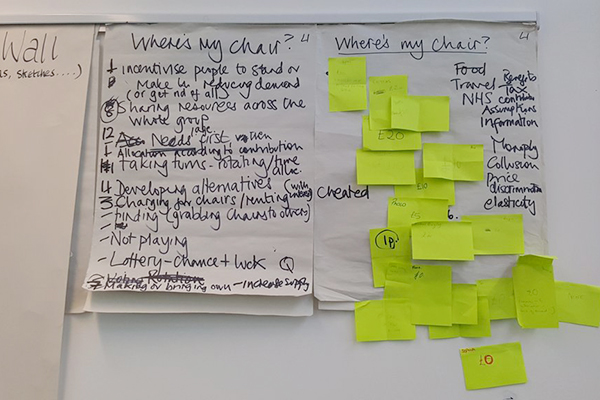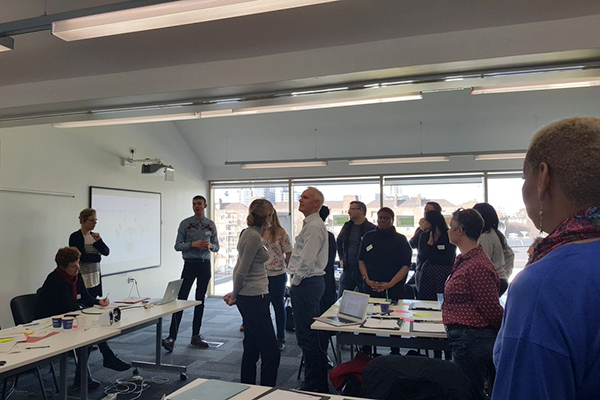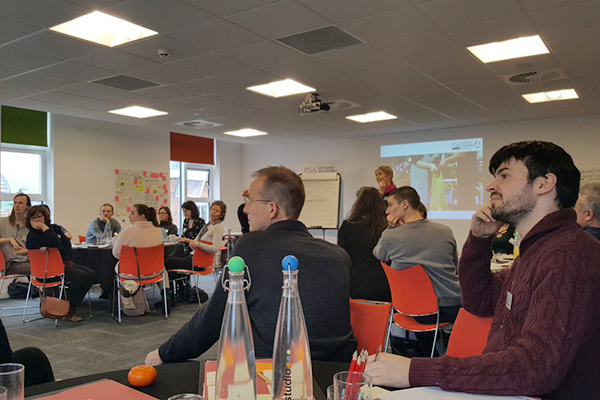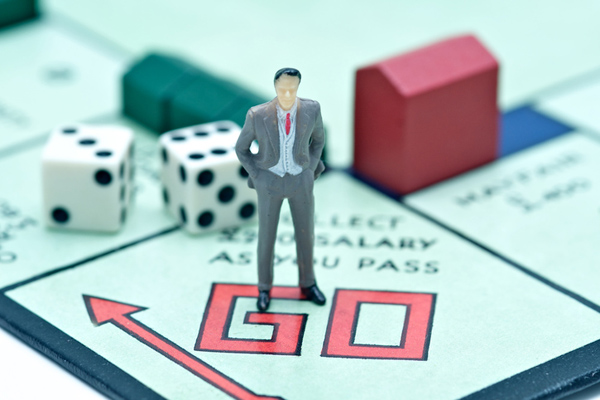In 2017, public trust in experts is seemingly at an all time low. This is old news of course, but we are yet to see many serious attempts to unravel the reasons and create mechanisms that could rebuild trust.
It's one of the many reasons why, back in February, I decided to attend the first meeting of the RSA Citizens' Economic Council in London.
My colleague Reema has wonderfully explained the purpose and objectives of the Council in previous blogs, but I have to admit that I was still sceptical about how it would work in practice. Getting a group of 30 strangers in a room to talk about economics and policymaking sounded ambitious to say the least. Would people get on? Would they be interested in the topic enough to talk to one another?
As the day wore on, my scepticism faded.
Mid-morning, the lead facilitators announced that we’d be playing a game called ‘Where’s my Chair?’ The group was divided into small teams of six, and each team had to face the ‘economic reality’ that they now only had four chairs available to sit on. The challenge was: how should we manage this shortage?

Each team came up with a variety of answers which the facilitators compiled into a master list. Everyone was then asked to vote for their preferred solutions. The results were as follows:
- Incentivise people to stand, or find a way to make chairs unappealing? 1 vote
- Sharing the chairs across the whole group (one group demonstrated that its possible to fit six people on four chairs if you pushed them together) 8 votes
- Offer chairs to the most vulnerable/needy first 12 votes
- Allocation according to contribution 1 vote
- Taking turns (creating a rota)
- Developing alternatives to chairs (increase supply) 11 votes
- Charging for or renting out the chairs 3 votes
- Finding or grabbing chairs from other teams or elsewhere
- Not playing the game
- Create a lottery system – leave it to chance/luck
Interestingly, most people voted for allocation to the most needy and vulnerable first. The second most popular choice was to develop alternatives to chairs. There were barely any votes for buying and selling chairs, or for taking resources from other teams by different means (which is perhaps more akin to how our economy actually works and how people behave within it). It was pointed out by the economists observing the event, that they would not usually base their predictions on rational actors putting other people’s needs before their own. This suggests that there is a contrast between what current economic models assume about our behaviour, and the reality of how we make financial decisions.

All the participants were then asked to suggest what price they would be prepared to pay for a chair, with the highest bid becoming the price of the chair - its market value, so to speak. Yet, once the price had been settled a few of the citizens said that they felt cheated. They didn’t feel they had enough information to really understand the value of the chair. What did not having a chair really mean? Did it mean sitting on the floor or standing (quite different levels of comfort)? Therefore the ‘value’ of the product felt arbitrary because it was based on the judgement of a diverse group with subjective needs and incomplete knowledge.
It was like watching the cracks in the economy emerge in real time.
The game then led onto a discussion about what is perhaps, the crux of the issue: what is the point of the economy?
Growth is often the standard answer (if you ask the RSA we’ll say inclusive growth), but that was not the answer given by the citizens I listened to. Their answer, almost unanimously, was that the economy exists to improve quality of life. You could argue that economic growth, if evenly distributed, should enhance quality of life but as the conversation evolved we discussed examples where that wasn’t always the case.
For anyone who’s ever taken a summer holiday in France, you may have noticed that shops, especially in more rural areas, will often close for three weeks in the summer to give the owners time off for a holiday - a clear prioritisation of wellbeing over profit. Similarly, I feel as though I see fewer advertisements in France, and more attempts to decorate otherwise dull environments such as car parks with hanging baskets or sculptures. A societal leaning towards aesthetics over commerce, perhaps? Of course these are just anecdotal observations, but they’re observations that push me to consider what quality of life really means, and whether the different elements that enable us to live well, are in opposition to the drivers of economic growth.

One citizen put it this way:
Have we been tricked into getting on the treadmill? If we reframed everything, had our own allotments for example, we’d save the planet, but it’s that versus business.
Another said:
People need to take their lives back – we’re products of society, we’re overbuying clothes, food, and we’re just contributing to the problem. Charities shops are bursting with stuff that people don’t want.
There was a lot of passion and consensus from the small group I worked with that reorganising the economy so that quality of life is at its heart, is the most important thing we could do.
One final thought. We must also start to re-prioritise face to face interaction.
Digital communication might be useful for sending information quickly, but for things like building trust and respect, we have to sit down and talk. Reality television shows, even current affairs programmes like Question Time, give the impression that people argue more than they agree. What I found at the Council meeting was the opposite. To establish a basis for discussion, our citizens sought common ground first, and I certainly found that having to look people in the eye is a useful way of finding out whether you really own your opinions. Without veering fully into Brené Brown territory – face to face discussion requires vulnerability, and that’s a good thing.
I look forward to the next one.
Related articles
-
Why Theresa May should reach for her inner Pankhurst: time for a National Citizens’ Jury on Brexit
Ed Cox
Ed Cox argues why we need a National Citizen's Jury on Brexit.
-
Why citizens should be economists too
Hettie O'Brien
Hettie O'Brien writes discusses how citizen interest in economics can best place us to speak truth about bad policy
-
Tackling populism through practical inclusion
Megan Corton Scott
In the current populist era an active initiative such as the Citizen’s Economic Council is not only necessary, but a breath of fresh air argues Megan Corton Scott.




Join the discussion
Comments
Please login to post a comment or reply
Don't have an account? Click here to register.
Economics is not about the sharing of limited opportunities as suggested here by the chairs game. It is about the way our produce and services can best be distributed through all of the communities, even though some will get much less than others. Economics is about the sharing of the least effort when making the greatest activity for creating the produce. Our demands are unending but we are not wishing to make more than the minimum expenditure of energy in satisfying them. The contradiction of these two aspects of our community is what causes us to participate in our social system of economics in the peculiar and individual way that we do..
Thanks Jeff I will take a look at that!
Alex, iI was my late colleague who asked the question - isn't the purpose of business and economics to benefit people. But which people?
He was describing what Matthew Taylor would write about here nearly 20 years later, an economy which benefits people, a people-centred economy.
Applying his business model for social benefit to the problem of institutionalised children in Ukraine, he wrote in 'A Marshall Plan' for Ukraine:
http://www.managementexchange.com/story/re-imagining-capitalism-new-bottom-line
Hi Brendan,
Thanks for you comment. Certainly you're right that in a global world we must learn to build trust and respect through digital means, and perhaps in professional context it's a bit easier as there is already an understanding of mutual aims. I just think there's a lot of evidence that on social platforms, less respectful behaviour emerges which can lead to unnecessary disputes. Online it can be harder to see the 'whole person' whereas face to face you're able to gauge body language etc - though of course something like Skype is vastly different to Twitter for example in terms of digital.
I love the chair exercise Alex, and what it revealed - I'll look to use it when I can!
I must take issue with your statement ''Digital communication might be useful for sending information quickly, but for things like building trust and respect, we have to sit down and talk".
I know this is received wisdom and may be the case for many but it really does not have to be. I have recruited, worked with and trust people from around the world I have never met courtesy of Skype, Zoom and other software that 'enables us to sit down and talk'. These tools do enable us to connect,build relationships and trust IF we want to use them, but many don't know how, or seem think that different rules apply online than when meeting in-person, which is not the case. Don't get me wrong; I love to meet people and there is no substitute when possible, but if we are to connect and work together to solve the challenges we face then we all need to learn to do so in the digital as well as physical world and learning to build trust is core to this. All the best, Brendan.